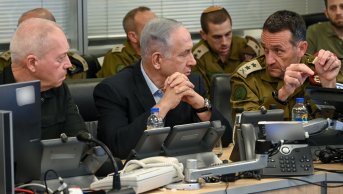Lingering Questions for New Episode in Turkish-Israeli Relations

Israel’s communication of its apology to Turkey for the “flotilla incident” raised expectations that relations between Ankara and Tel Aviv will take off.
There have been and still are some broad questions that beg attention in the Middle East before contemplating the future of these relations. The tide of change is evident so far, and it is likely to affect the clichés in the minds of policymakers and peoples in the region.
The first concept to be explored is the term “balance.” It sounds like presuming “equality,” but it indeed refers to the “equilibrium” of state interests. Change in state power -- and in the case of the Middle East, military capability -- will significantly alter “balances.” An intangible form of power that is convertible to political currency is prestige and status, which might arrive as a result of such an increase in military-strategic capability or a successful mediator/facilitator role. Those who benefit from the status quo would not want this “balance” to be changed, hence would oppose the “revisionists.”
The second point is the question of political and security culture in the Middle East and of different states. Their culture of forming polities and the conception of security determine their policies. One needs to look at the holy books and history to grasp where and how they position certain individuals, groups or states vis-à-vis others, and how they legitimize the use of force. Only then can we assess the importance of -- hence the need for -- leadership and superiority, and the meaning of security for states in the Middle East, which goes beyond our training in traditional international relations theories.
The third concept is “perception,” which is borrowed from psychology. Perception forms reality in the mind, which is why our first exposure to new information is valuable. The 21st century is the age of mass communication. Social media took a powerful tool out of the hands of the state: The media informed the citizens and external actors before others did. Perceptions of individuals can be shaped or re-shaped by continuous exposure to new information, which challenges the established information. This is significant for the Middle East, where fears were turned into hatred and exploited for political ends.
The above points provide conclusions/suggestions for Turkish-Israeli relations: First, despite their differences, geopolitics dictates that cooperation is its desired option because tension has proven to be unsustainable. Second, the meaning of and the need for security for Israel shape its rationality; therefore, risk-taking or wishful thinking about Tel Aviv’s reactions is not recommended. Third, depicting one culture, religion or ethnicity as superior to another in the search for domestic approval is not sustainable, either: Principles and policy should be in parallel; otherwise, it results in a serious credibility problem.
Viewed from the “familiar” spectacles, Turkish-Israeli relations are likely to be affected by the following factors: relations with the United States, Iran and its nuclear program, and energy policies in the east Mediterranean.
The 1990s and early 2000s were periods of strategic cooperation between Turkey and Israel, particularly in military matters. Israeli officials were visiting Turkey in the context of talks for the establishment of a theater missile defense system against the capabilities of Iran, Iraq and Syria. The widely pronounced “threat” was Iran due to its missile program. Currently, Israel perceives it as the main threat to its security. The “new episode” in Ankara-Tel Aviv relations will be marked by discussions on measures to respond to the “threat.” Ankara has reservations regarding the military option. Turkey’s preferred response to cope with the challenge of Iran’s nuclear program does not coincide with that of Tel Aviv, because of the difference in their perception of threat.
Cooperation in the energy field would benefit both countries: Turkey does not have any strategic energy resources, but sits on the routes for their transportation; therefore, it seeks to be an “energy hub.” According to a recent news report on la Croix, the Turkish-Israeli rapprochement was because of the talks between Turkish firms and the consortia exploiting the natural gas fields of Israel.
Ankara has been uneasy about Israeli-Cypriot cooperation in the east Mediterranean regarding natural gas exploration. The eurozone crisis badly hit the economy of Cyprus and created an urgent demand for new funds. Natural gas could be viewed as a lifebuoy by the Cypriots. It remains to be seen how this cooperation will progress in the coming weeks and months and how it will affect Turkish-Israeli relations


